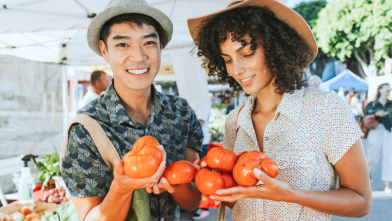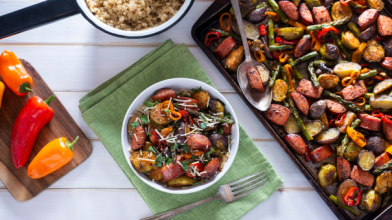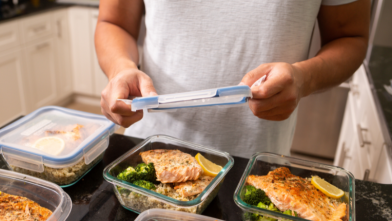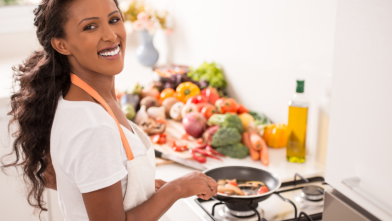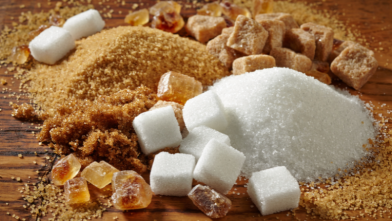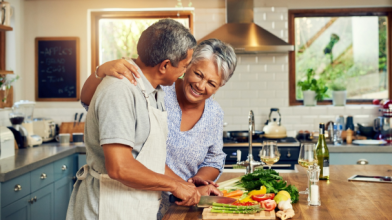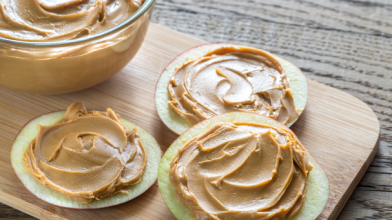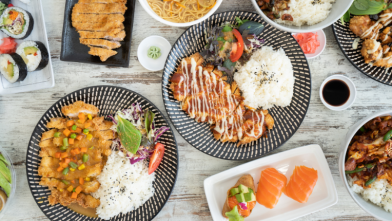Staying home and limiting your contact with other people is the most effective way to stay safe and avoid COVID-19. However, some trips outside are essential, like shopping for groceries. Read on for simple tips to make grocery shopping safer.
You know the phrase, when life gives you lemons, make lemonade? Well there’s a whole lot of lemons out there right now, and if you're like me, you're trying your best to stay positive during this difficult time and make some lemonade (albeit sugar-free lemonade).
For instance, many of us have more time on our hands and are not being challenged by social events or eating out where it's hard to make healthy choices. Now is a great time to be inspired to cook at home, sit down to family meals, slow down, enjoy the food we eat, and be a little more mindful. Staying at home can be stressful for sure, but there are silver linings!
That said, cooking more meals at home requires shopping for groceries, which has suddenly become much more complicated. The CDC and other expert groups are recommending that populations at increased risk for COVID-19 and its complications take extra precautions to protect their health—and this includes people with diabetes.
View our complete guide to staying healthy while staying home
Here are some tips to help you stay safe before, during, and after shopping for groceries.
Before you go to the store:
- If you are at high risk, consider having a family member or friend get your groceries for you or use a grocery delivery service if available. Many stores now allow you to order groceries online for pickup or delivery. Keep in mind that this means another person will be handling your items, so you need to balance the risk with this option.
- If you plan to go to the grocery store, try to minimize your shopping trips by making a list for what you will need for the next week or two. Organize your list by department, if you can, to help shopping go faster and limit your time in the store.
- Try to shop first thing in the morning. This is usually the least crowded time, and many supermarkets have cleaned and sanitized the store the night before.
- Find out if your supermarket has special shopping times for seniors and people at higher risk. This is typically early in the morning, for the reasons mentioned above.
- It is now recommended that everyone cover their mouth and nose with a cloth face covering when leaving the house. This is especially important for people at higher risk.
While you’re shopping:
- When entering the store, use a disinfecting wipe to clean the handlebar on your shopping cart.
- Avoid touching your eyes, nose, and mouth until you can wash your hands at home. Wearing glasses and a cloth face covering when shopping will help.
- For extra protection, you can have a sanitation wipe in each hand as you grab your items, open freezer doors, touch the keypad at the checkout line, etc. You can use disposable gloves, too, but make sure to remove them without touching the outside of the gloves. Remember, you will still need to avoid touching your face while wearing gloves.
- Stay at least 6 feet away from others while shopping and in lines. Even if you are wearing a mask, it’s still important to maintain social distancing.
- If you are worried about handling pieces of fruit, like apples and oranges, you can slip your hand in the plastic bag from the produce section, using it like a glove to grab your fruit. Then slip the bag around the fruit and remove your hand.
- When paying for your groceries, try to pay without touching money, a card, or a keypad. If you do have to touch a keypad, you can hold the sanitation wipe around your finger so it touches the surface, or you can use hand sanitizer or a sanitation wipe right after paying.
When you get home:
- Wash your hands when you return from the store with soap and warm water, and always wash your hands before and after prepping food.
- Most experts agree the biggest risk when grocery shopping comes from being in the store around other people, not from picking up the virus from surfaces, so there’s no need to wash or sanitize packaged groceries when you get home. It likely won’t hurt to take extra precautions, like wiping down packaged products with sanitizing wipes, but as long as you wash your hands after handling groceries and clean your countertops after everything is put away, you should be fine.
- There is mixed advice about washing produce. Some experts recommend washing all fruits and vegetables as soon as you return from the store. However, washing some types of produce can make them spoil faster. Either way, be sure to wash all produce before you eat it.
- The USDA recommends washing produce under cold running tap water (no need to use soap!) to remove any lingering dirt before eating or cooking it. For produce with a firm surface, such as apples and potatoes, you can scrub with a clean brush as well. If you want to dry produce after washing it, be sure to use a clean towel.
- Make it a regular habit to clean and disinfect kitchen countertops and other frequently touched surfaces like refrigerator door handles, the faucet handle, and door knobs.
Elaine Magee, MPH, RD, is a staff nutrition expert for a large national grocery chain and the author of 25 books, including the best-selling, Tell Me What to Eat if I Have Diabetes (4th edition). You can follow her on Instagram, @TheRecipeDoctor.







